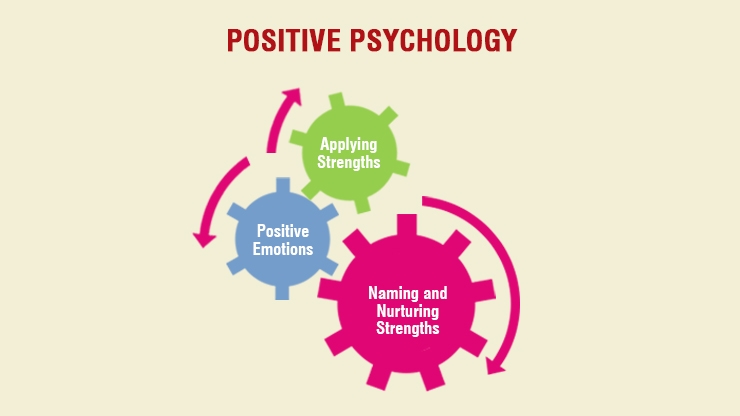Positive psychology is described as the scientific study of what makes life most worth living (Peterson, 2008). It is the study of behavior, feelings and human thoughts which strive to focus on human strengths rather than weaknesses. The focus of positive psychology is on building the good in life instead of repairing the bad, and taking the lives of people up to enhance it or make it “better” instead of focusing on moving individuals who are struggling up to a “normal” (Peterson, 2008).
Focus of Positive Psychology in a Nutshell
As a discipline, positive psychology focuses much of its time on enhancing and researching about topics like character strengths, optimism, well-being, life satisfaction, happiness , gratitude, compassion, self-compassion, self-esteem, confidence, hope and elevation.
The focus of positive psychology is on the “positive” events and influences in life, such as:
- Focusing on positive states and traits such as gratitude, resilience and compassion.
- Focusing on positive experiences like happiness, joy, inspiration.
- Applying positive psychology to institutions, for example, applying positive principles within organizations and institutions.
Benefits of Positive Psychology
Over the years the researches on positive psychology has taught the potential and power of shifting focus and how change of shifting one’s perspective can bring overall growth and development in one’s life.
The exercises or techniques and the programs that are based on the theory of positive psychology focuses on how small changes in one’s
This is the focus of many techniques, exercises, and even entire programs based on positive psychology because a relatively small change in one’s perspective can lead to astounding shifts in the overall well-being and quality of life of the individual. Introducing optimism and gratitude into lives is a simple action and step that can give one a radically more positive outlook on life as a whole.
Integrating positive psychology in practice
According to the director of the Coaching and Positive Psychology Initiative at Harvard’s McLean Hospital Carol Kauffman, there are four major techniques for integrating and implementing the principles of positive psychology into more the traditional types of individual or group therapy practiced today.
Reverse the focus from negative to positive.
Many people tend to overthink and dwell on negative events or emotions and ignore the positive ones — and often therapy can encourage this. Positive psychology aims to reverse this focus and foster a positive outlook for life. One way used to reverse the focus is to use techniques that are aimed at shifting attention to a more positive aspect of life that are often overlooked. For example, maintaining a gratitude journal that focuses on the things in life that one can be grateful for can shift the focus and develop more positive outlook towards life.
Balancing the positive and negative
It is essential for people to identify and foster the positive for themselves and others in order to provide a balance to the negative. For example, while evaluating employers can mix praise with constructive criticism when evaluating employees to focus on their strength and nurture their growth.
Developing a language of strength.
Clinical psychologists and psychotherapists often deal with individuals in their sessions who complain about negative emotions like anger, pain and conflicts negative emotions and thoughts are common aspects of life but it often makes life harder, even difficult to identify personal strengths and other positive qualities.
Therapists and clinicians like Kauffman who base their work on the concepts of positive psychology focus strengths while advising patients. Much like as an athlete who exercises to become stronger, individuals who use their strengths on a regular basics become stronger and better functioning.
Building strategies that foster hope
In positive psychology, hope is seen as a strength. An elixir to deal with the adversities of life and overcome challenges. Fining ways to look as positive aspects and develop hope as strength is always a focus.
One way to cultivate hope is to reduce the scope of the problem — perhaps by breaking it down into components that can be tackled one at a time. Another way is to identify skills and coping mechanisms that would enable someone to overcome a particular challenge, and then provide a way to build them.
The last decade saw a rise in interest in psychology and the positive role it has to play in both individual and community level. With many researchers and psychologists interested in its role, it is expected to play a bigger role in future.













 6 Sep 2021
6 Sep 2021



